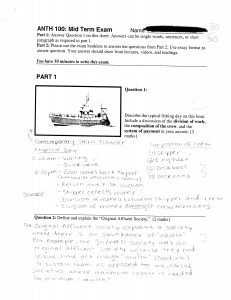2012-Final Exam Essay Questions
You may bring this sheet (see linked pdf: Final-exam-essay?) with you to the final exam.
You can write an essay outline on this sheet. ONLY AN OUTLINE; NOTHING MORE.
You will write your name on this sheet and hand it in with your final exam.
The final exam will be scored out of 40 marks (worth 40% of your final grade).
Part 1 of the exam is 20 points (questions will be handed out on exam day).
Part 2 is 20 points with each essay question worth 10 points.
Select two of the following questions to prepare for your final exam.
The essay portion will be evaluated in accord with the writing guidelines listed on your course outline. The best answers will be those that are able to effectively draw from a wide range of the course materials, go beyond straight description, and include evaluation and analysis of the materials. Even though the questions do not explicitly say – answer from course materials- you should assume that is implied. Your role in preparing for your exam essays is to reflect upon the overall content and structure of the course, to delve as deeply as possible within the subject matter and then to prepare to write a detailed an essay as possible. Use your chance to prepare an outline (which you write by hand on this sheet of paper) to assist you in preparing a skeleton (or close line ☺ ) upon which to drape the body of your paper.
The Essay Questions.
1. What is neo-liberalism and what are the cultural analogs of neoliberalism? In your essay provide at least two examples of neo-liberalism in action.
2. Compare and contrast kinship systems and their associated ideologies of gender in relation to the ‘family’ as a unit of (re)production.
3. Describe and evaluate the ways that culture, gender, race, and nationality are deployed to create a society that is biased in favour of violence.


